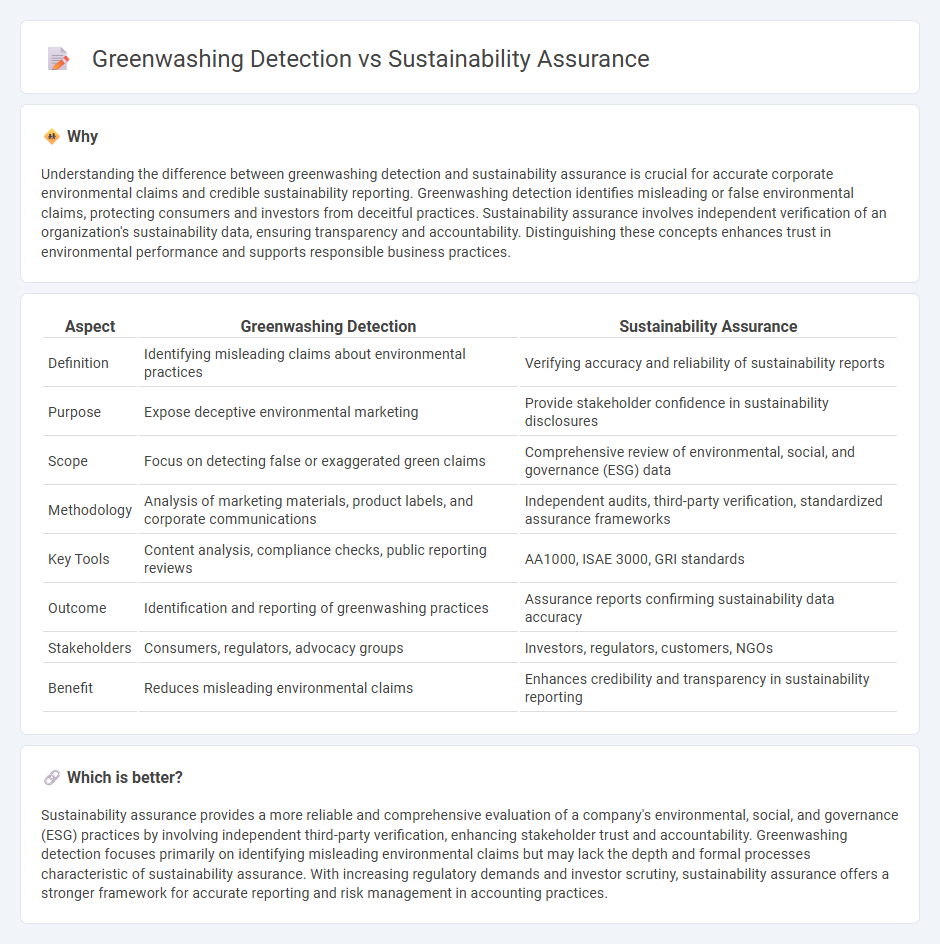
Greenwashing detection identifies misleading corporate claims about environmental practices to protect consumer interests and ensure transparency. Sustainability assurance involves third-party verification of a company's environmental, social, and governance (ESG) disclosures to enhance credibility and stakeholder trust. Explore the differences and implications of these approaches for more informed accounting decisions.
Why it is important
Understanding the difference between greenwashing detection and sustainability assurance is crucial for accurate corporate environmental claims and credible sustainability reporting. Greenwashing detection identifies misleading or false environmental claims, protecting consumers and investors from deceitful practices. Sustainability assurance involves independent verification of an organization's sustainability data, ensuring transparency and accountability. Distinguishing these concepts enhances trust in environmental performance and supports responsible business practices.
Comparison Table
| Aspect | Greenwashing Detection | Sustainability Assurance |
|---|---|---|
| Definition | Identifying misleading claims about environmental practices | Verifying accuracy and reliability of sustainability reports |
| Purpose | Expose deceptive environmental marketing | Provide stakeholder confidence in sustainability disclosures |
| Scope | Focus on detecting false or exaggerated green claims | Comprehensive review of environmental, social, and governance (ESG) data |
| Methodology | Analysis of marketing materials, product labels, and corporate communications | Independent audits, third-party verification, standardized assurance frameworks |
| Key Tools | Content analysis, compliance checks, public reporting reviews | AA1000, ISAE 3000, GRI standards |
| Outcome | Identification and reporting of greenwashing practices | Assurance reports confirming sustainability data accuracy |
| Stakeholders | Consumers, regulators, advocacy groups | Investors, regulators, customers, NGOs |
| Benefit | Reduces misleading environmental claims | Enhances credibility and transparency in sustainability reporting |
Which is better?
Sustainability assurance provides a more reliable and comprehensive evaluation of a company's environmental, social, and governance (ESG) practices by involving independent third-party verification, enhancing stakeholder trust and accountability. Greenwashing detection focuses primarily on identifying misleading environmental claims but may lack the depth and formal processes characteristic of sustainability assurance. With increasing regulatory demands and investor scrutiny, sustainability assurance offers a stronger framework for accurate reporting and risk management in accounting practices.
Connection
Greenwashing detection and sustainability assurance are interconnected through their shared goal of promoting transparency in corporate environmental claims. Sustainability assurance verifies the accuracy and reliability of sustainability reports, helping to identify misleading or exaggerated claims that constitute greenwashing. By integrating these processes, organizations can enhance stakeholder trust and support genuine sustainable business practices.
Key Terms
Independent Assurance
Independent assurance in sustainability reporting ensures the credibility and reliability of environmental, social, and governance (ESG) disclosures, reducing risks of greenwashing by providing objective verification. External auditors assess the accuracy of sustainability claims against established standards such as GRI, SASB, or TCFD frameworks, enhancing stakeholder trust and corporate transparency. Explore how independent assurance practices differentiate genuine sustainability efforts from deceptive greenwashing tactics.
Materiality Assessment
Materiality assessment plays a crucial role in sustainability assurance by identifying and prioritizing environmental, social, and governance (ESG) issues that significantly impact a company's performance and stakeholder interests. Effective materiality assessment enhances transparency and accountability, reducing the risk of greenwashing by ensuring that sustainability claims are backed by verifiable data and aligned with stakeholder expectations. Explore further to understand how robust materiality assessment methodologies can safeguard corporate integrity and promote authentic sustainability practices.
Non-Financial Reporting
Sustainability assurance ensures the accuracy and reliability of non-financial reporting by verifying environmental, social, and governance (ESG) data against established standards such as GRI and SASB, promoting corporate transparency and stakeholder trust. Greenwashing detection involves identifying misleading claims in sustainability reports that exaggerate environmental benefits or mask negative impacts, often through advanced techniques like AI-driven textual analysis and third-party audits. Explore the latest methodologies and best practices for enhancing credibility and combating deceptive reporting in non-financial disclosures.
Source and External Links
What is Sustainability Assurance? - ESG | The Report - Sustainability assurance is a formal evaluation involving third-party verification of a company's environmental, social, and economic impacts to improve credibility and transparency of sustainable practices.
Understanding the International Standard on Sustainability Assurance - IAASB - ISSA 5000 is a global, principles-based framework for conducting assurance engagements on sustainability disclosures, designed to enhance report reliability and transparency.
FAQs: fundamentals to assurance on sustainability reporting - Independent external assurance over sustainability information, mandatory under the EU Corporate Sustainability Reporting Directive, increases reliability and supports informed stakeholder decisions.
 dowidth.com
dowidth.com